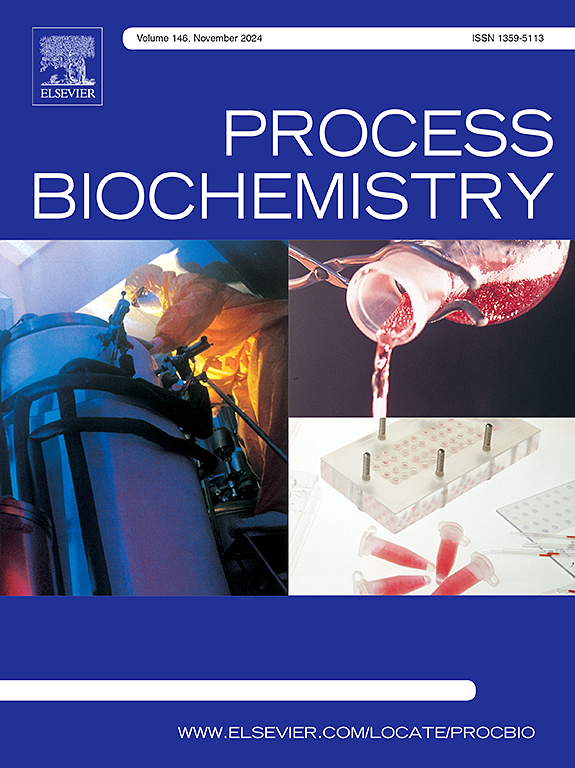Stable biofilm formation via nutrition regulation for enhancing toluene removal in gas–solid fluidized-bed bioreactors
IF 4
3区 生物学
Q2 BIOCHEMISTRY & MOLECULAR BIOLOGY
引用次数: 0
Abstract
Gas-solid fluidized-bed bioreactors (FBRs), an innovative equipment for gaseous volatile organic compound (VOC) treatment, are used to realize efficient removal of VOCs characterized by large volumes and low concentrations and avoid clogging due to excessive biofilm accumulation. However, difficulties in biomass accumulation caused by stressful environmental pressures, especially shear force, limit their development. In this study, two laboratory-scale FBRs were built, and toluene removal was nearly twiced with saturated relative humidity and adequate nutrition supplement. Accelerated biofilm formation, activated microbial metabolism, enhanced mechanical strength, and surface smoothness were also observed. Nutrition regulation optimized cell synthesis and extracellular polymeric substance secretion through alternation of the accumulation of elements, especially C/N and Ca, which increased by 84 % and 112 %, respectively. The biofilm loss was reduced by 50–75 % under compression and collision conditions, indicating the promoted biofilm stability under shear force caused by extrusion and collision between particles. With the initial drawbacks partially mitigated, nutrient regulation during FBR operation was found to be useful. This study provides theoretical support for further applications of FBRs and efficient treatment of gaseous VOCs with large gas volumes and low concentrations.
通过营养调节形成稳定的生物膜以增强气固流化床生物反应器中甲苯的去除
气固流化床生物反应器(FBRs)是一种新型的气态挥发性有机化合物(VOC)处理设备,可实现大体积、低浓度VOCs的高效去除,避免因生物膜堆积过多而堵塞。然而,环境压力,特别是剪切力造成的生物量积累困难,限制了它们的发展。在本研究中,建立了两个实验室规模的fbr,在饱和相对湿度和充足营养补充的情况下,甲苯去除率接近两倍。加速生物膜的形成,激活微生物代谢,增强机械强度和表面光滑度。营养调节通过改变元素的积累,优化了细胞合成和细胞外聚合物质的分泌,特别是C/N和Ca的积累,分别提高了84 %和112 %。在压缩和碰撞条件下,生物膜的损失降低了50-75 %,表明生物膜在颗粒间挤压和碰撞产生的剪切力作用下的稳定性得到了提高。随着最初的缺点部分减轻,快堆操作期间的营养调节被发现是有用的。该研究为fbr的进一步应用和高效处理大气量低浓度气态VOCs提供了理论支持。
本文章由计算机程序翻译,如有差异,请以英文原文为准。
求助全文
约1分钟内获得全文
求助全文
来源期刊

Process Biochemistry
生物-工程:化工
CiteScore
8.30
自引率
4.50%
发文量
374
审稿时长
53 days
期刊介绍:
Process Biochemistry is an application-orientated research journal devoted to reporting advances with originality and novelty, in the science and technology of the processes involving bioactive molecules and living organisms. These processes concern the production of useful metabolites or materials, or the removal of toxic compounds using tools and methods of current biology and engineering. Its main areas of interest include novel bioprocesses and enabling technologies (such as nanobiotechnology, tissue engineering, directed evolution, metabolic engineering, systems biology, and synthetic biology) applicable in food (nutraceutical), healthcare (medical, pharmaceutical, cosmetic), energy (biofuels), environmental, and biorefinery industries and their underlying biological and engineering principles.
 求助内容:
求助内容: 应助结果提醒方式:
应助结果提醒方式:


